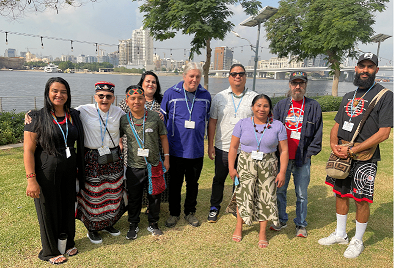
- Details
- By Native News Online Staff
The International Environmental Network (IEN) will host a panel on Saturday at the nine-day Conference of Parties (COP28) now underway in Dubai, United Arab Emirates. The panel discussion is named False Solutions vs Real Solutions to the Climate Crisis: Indigenous Water Protectors Defending their livelihoods, Lands and Territories.
The panel will be an inter-generational discussion with Indigenous water protectors on how the climate crisis and false solutions to climate change are impacting their livelihoods, lands, and territories. Real solutions to the climate crisis, rooted in Indigenous worldviews, values, and our relationship with water will be presented.
The details for the panel are:
When:
Saturday, December 2, 2023, 18:30-19:30
NEW LINK - Watch Live HERE: https://youtube.com/live/
Moderator:
Kandi White (Arikara, Mandan, & Hidatsa Nations) Program Director, Indigenous Environmental Network
Speakers:
- Shyrlene Oliveira da Silva Huni Kui, Representative of the Huni Kui Indigenous Peoples, Amazon
- Jack Collard (Nyoongar Nation) Director of Aboriginal and Torres Strait Islander International Engagement Organisation
- Jayce Chiblow (Garden River First Nation), Education and Training Manager, Indigenous Climate Action
- Tom BK Goldtooth (Diné/ Dakota), Executive Director, Indigenous Environmental Network
Brief biographies for each panel speaker are listed below:
Shyrlene Oliveira Dasilva Huni Kui,
Representative of the Huni Kui Indigenous Peoples, Amazon
Jack Collard
(Nyoongar Nation), Director of Aboriginal and Torres Strait Islander International Engagement Organisation
 Make A Donation Here
Make A Donation Here
Tom BK Goldtooth
(Diné/ Dakota) Executive Director, Indigenous Environmental Network
Tom is the Executive Director of the Indigenous Environmental Network (IEN), the oldest Indigenous- based and grassroots network working on environmental, energy, climate and economic justice issues in North America including the rights of Indigenous Peoples. Tom has been the lead of the Indigenous delegation of IEN within the UN Framework Conference on Climate Change (UNFCCC) since COP 04 in Buenos Aires, Argentina in 1998. Tom and IEN participated in the formation of the International Indigenous Peoples Forum on Climate Change (IIPFCC) in 2008. Tom has been awarded with recognition of his achievements throughout the past 32 years as a change maker within the environmental, economic, energy and climate justice movement. From his participation and leadership in the First National People of Color Environmental Justice Leadership Summit in 1991 in Washington D.C., to the 2010 World Peoples’ Conference on Climate Change and the Rights of Mother Earth in Cochabamba, Bolivia, and to the recent co-formation of the US-based Green New Deal Network and the United Frontline Table and its People’s Orientation to a Regenerative Economy platform, he has been on the forefront of key moments fighting for systemic change.
In 2007, Tom co-founded the Indigenous World Forum on Water and Peace lifting up the spiritual- cultural values and ethics of water policy. Tom initiated the first international Indigenous conference on the rights of Mother Earth in 2012 at the Haskell Indian Nations University and serves as a member of the Global Alliance of the Rights of Nature. Tom wrote the IEN Indigenous Principles of Just Transition as an organizing tool of using Indigenous Original Instructions as the foundation for building sustainable and healthy Indigenous communities. Tom is a recipient of numerous awards including the 2015 Gandhi Award and in 2016 was presented Sierra Club’s highest recognition, the John Muir award.
More Stories Like This
A River Worth Defending: Chilkat Community Mobilizes Against MineU.S. Forest Service Approves Drilling at Pe’ Sla, Threatening Indigenous Land and Water
Gwich'in Tribal Governments Submit Comments Challenging Fish and Wildlife Service's Inadequate Environmental Review of Arctic Refuge Snow Road
Rappahannock Tribe Challenges 9M-Gallon Water Plan
Feds release draft long-term plans for Colorado River management
Help us defend tribal sovereignty.
At Native News Online, our mission is rooted in telling the stories that strengthen sovereignty and uplift Indigenous voices — not just at year’s end, but every single day.
Because of your generosity last year, we were able to keep our reporters on the ground in tribal communities, at national gatherings and in the halls of Congress — covering the issues that matter most to Indian Country: sovereignty, culture, education, health and economic opportunity.
That support sustained us through a tough year in 2025. Now, as we look to the year ahead, we need your help right now to ensure warrior journalism remains strong — reporting that defends tribal sovereignty, amplifies Native truth, and holds power accountable.
 The stakes couldn't be higher. Your support keeps Native voices heard, Native stories told and Native sovereignty defended.
The stakes couldn't be higher. Your support keeps Native voices heard, Native stories told and Native sovereignty defended.
Stand with Warrior Journalism today.
Levi Rickert (Potawatomi), Editor & Publisher

